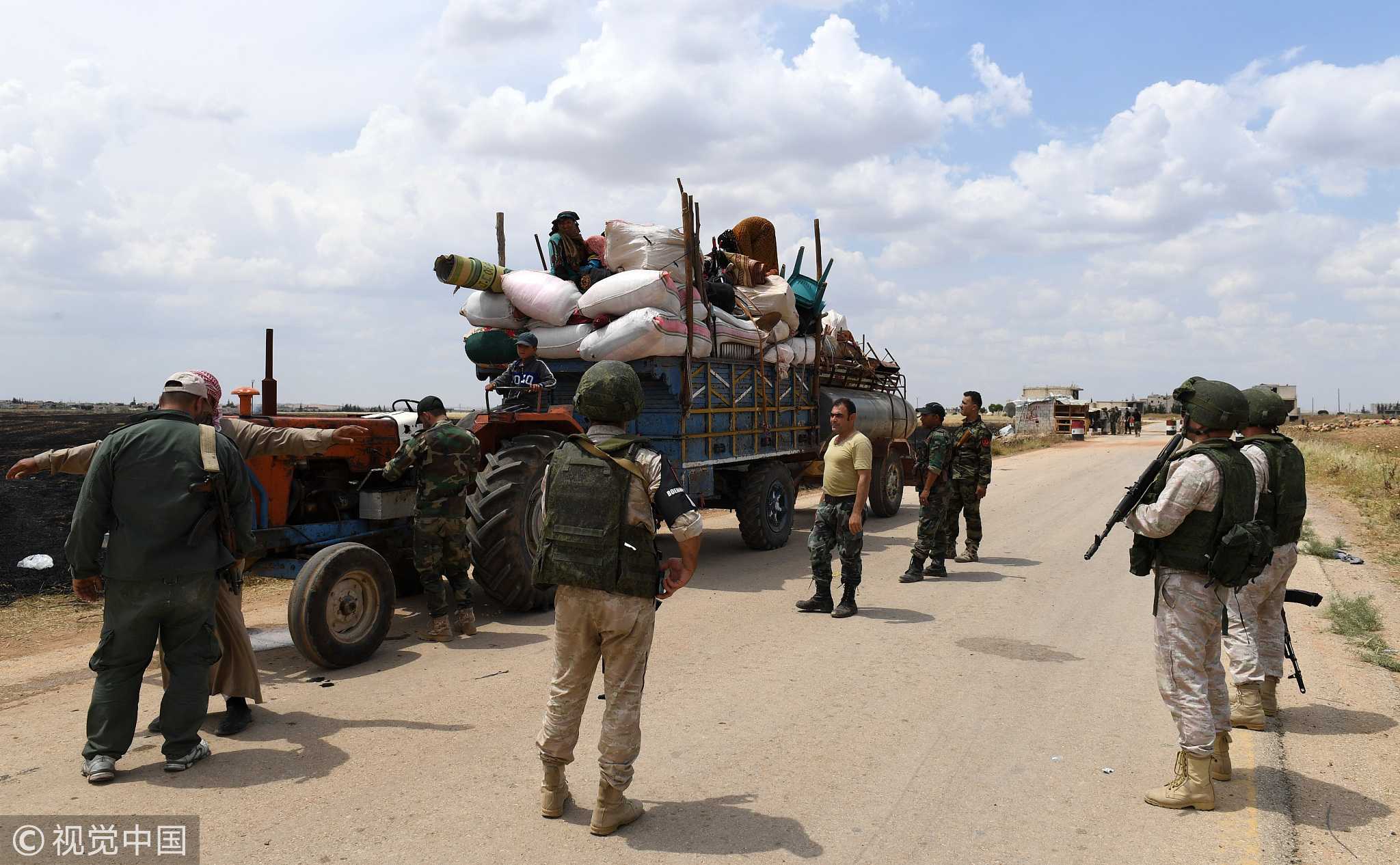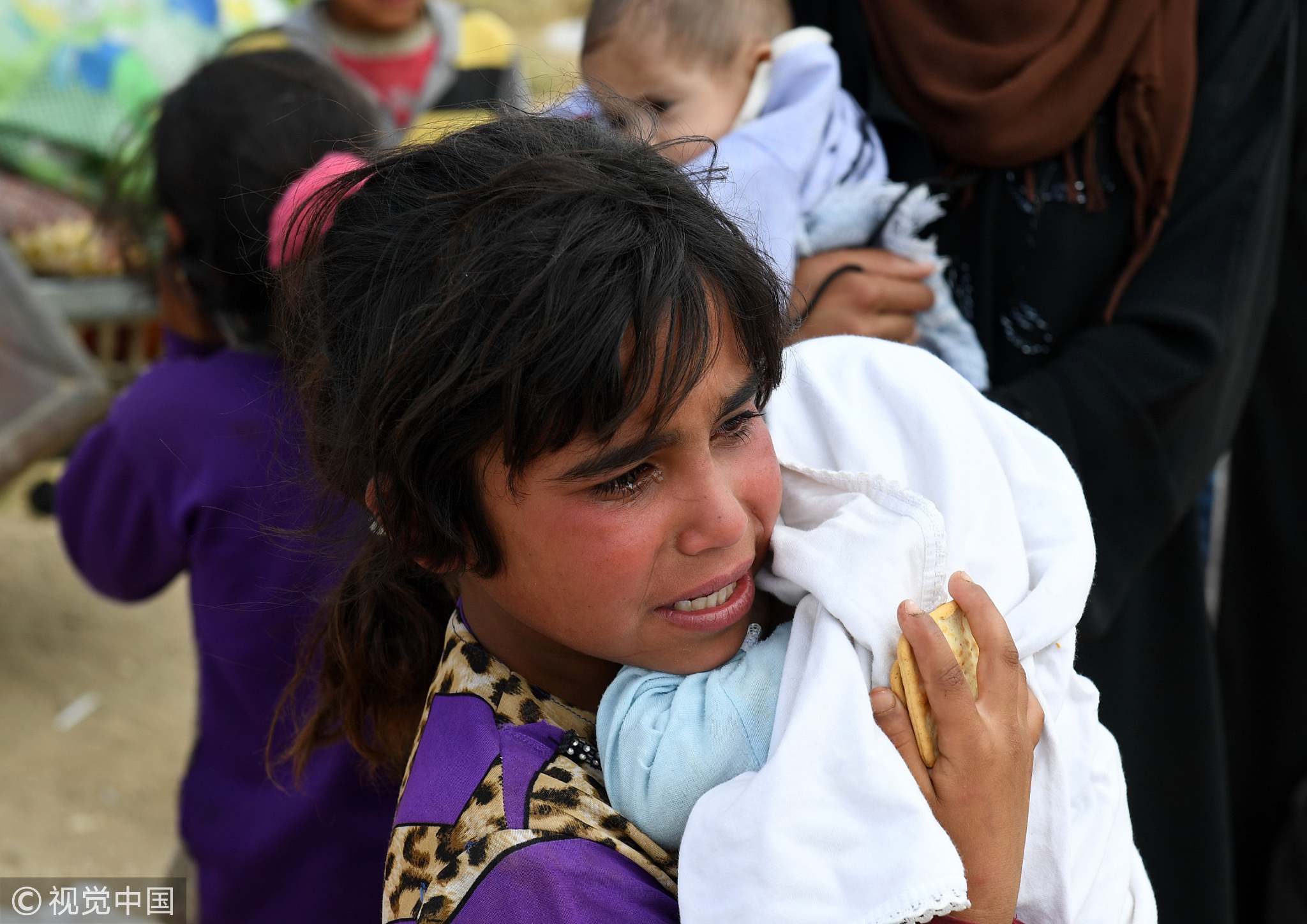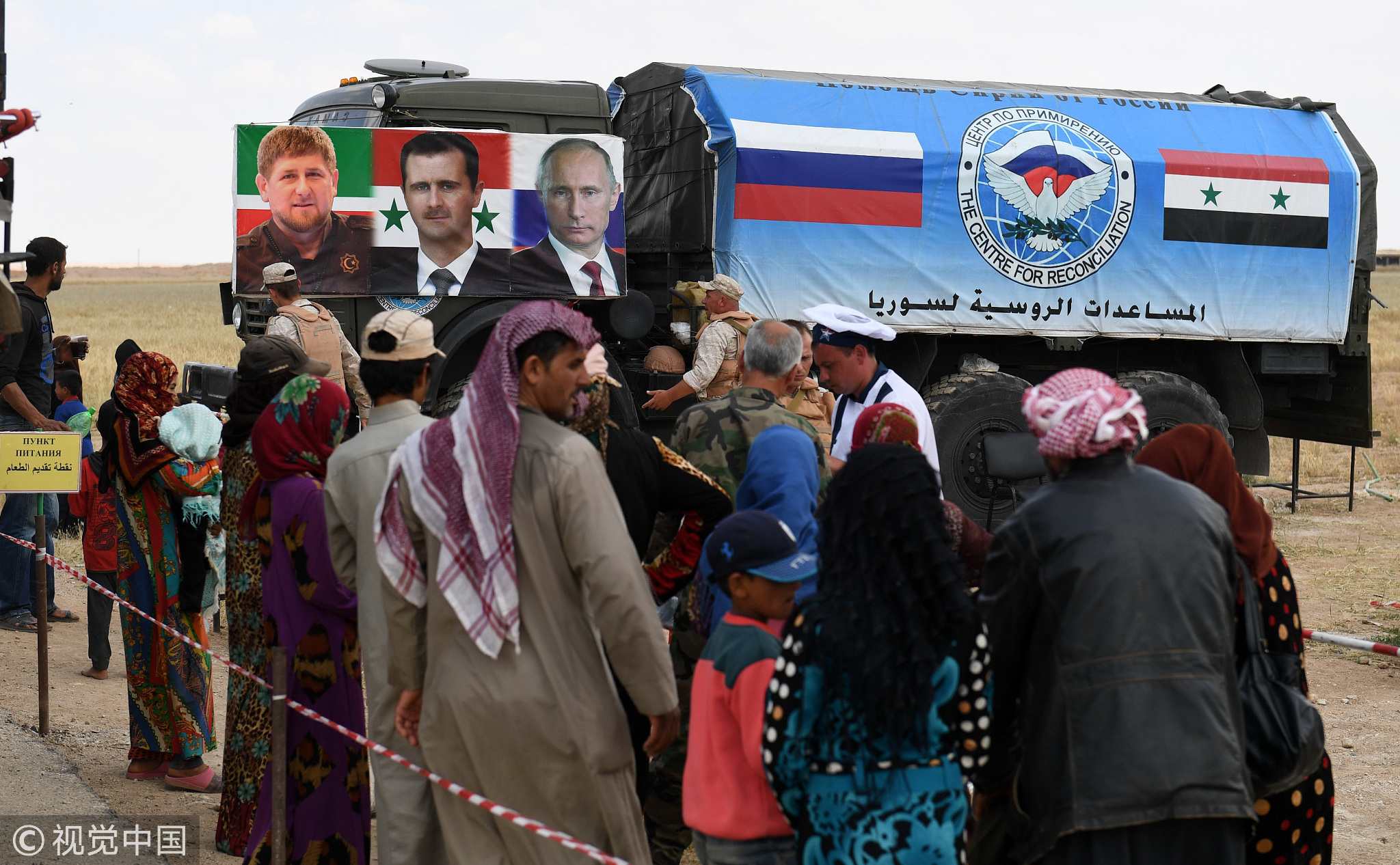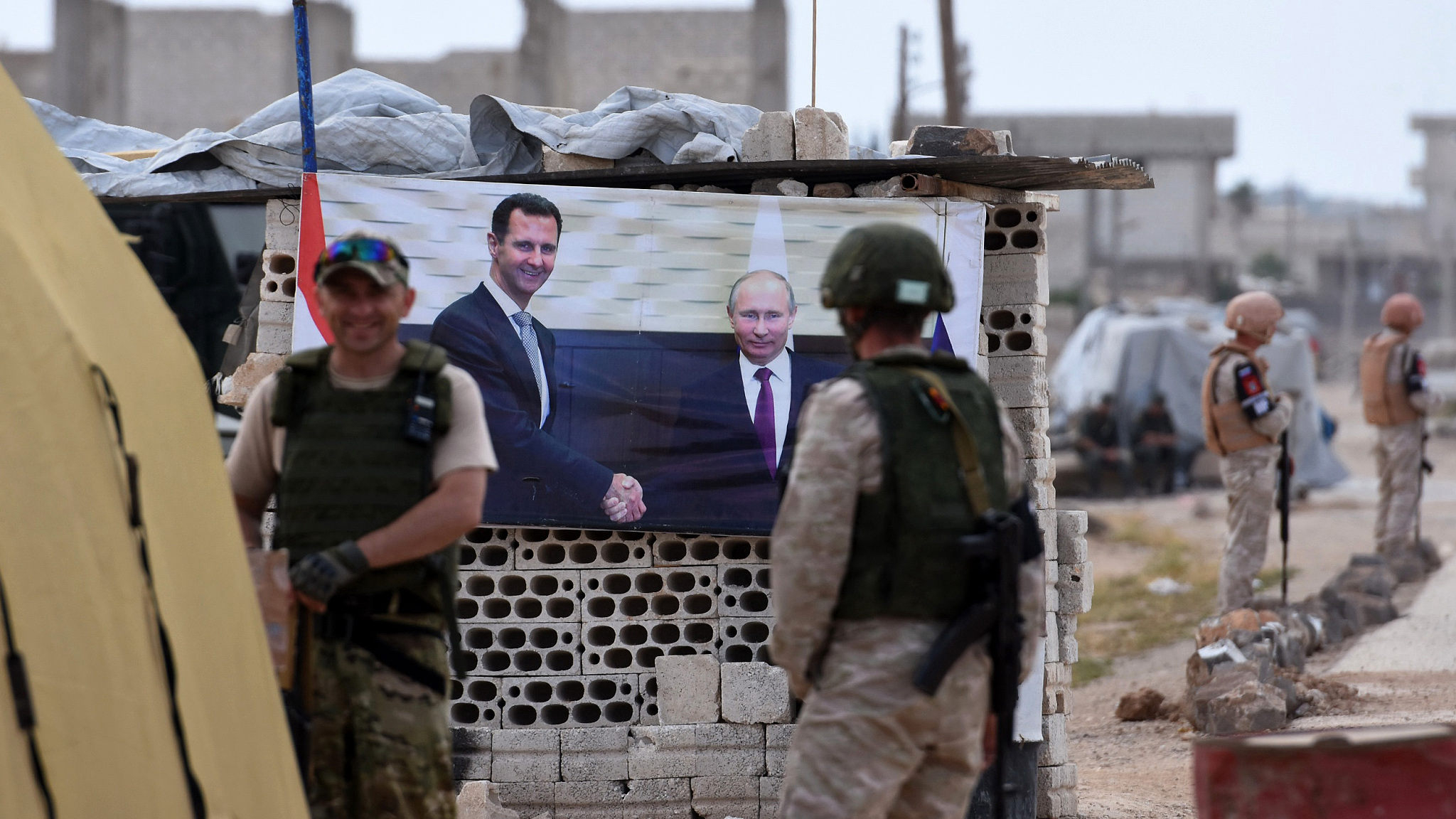Editor's note: Wang Jin is a research fellow at Charhar Institute and research fellow at the Northwest University of China. The article reflects the author’s opinion, and not necessarily the views of CGTN.
As the most important foreign power in the Syrian civil war, Russia’s policy in Syria has not succeeded in bringing about a process of political settlement that would end the civil and proxy war.
Russia has hosted dozens of meetings in Sochi, and has organized and attended both Astana and Geneva conferences with the efforts to end the Syrian civil war and restart the political construction. However, the divisions between the Syrian government and several major opposition blocs, and among different regional and international powers still exist.

Members of the Russian military police stand by as Syrian government soldiers inspect a tractor-pulled trailer arriving in a convoy carrying displaced people returning home to government-controlled territory at Abu al-Zuhur checkpoint in the western countryside of Idlib province, June 1, 2018. /VCG Photo.
Members of the Russian military police stand by as Syrian government soldiers inspect a tractor-pulled trailer arriving in a convoy carrying displaced people returning home to government-controlled territory at Abu al-Zuhur checkpoint in the western countryside of Idlib province, June 1, 2018. /VCG Photo.
Russia's final goal is to organize a centralized government led by Bashar Assad, uniting it with different political and military opposition parties, with the efforts to end Syrian civil war as early as possible.
In the absence of an effective process toward reaching a settlement, Russia will have to continue supporting Assad’s forces, maintaining the areas they control and keeping vigilant against the possible military conflict between Syrian government forces and rebel forces, especially in the Idlib Province of northern Syria and Derra Province in the southern Syria.
Following the recent military tension between Israel and Iran over Syria, Russia needs to make decisions and find an opening for starting a political process to decrease the rising tension in Syria.
Although many Western diplomats and political experts describe Russia as the “concertmaster” in the Syrian civil war, Russia alone is not able to determine the development of the civil war. As an ally of Russia in the Syrian conflict, Iran has kept its independent policy, and is working to promote its presence and influence over the Syrian government.

A Syrian girl carries a child while receiving food aid from Russian military personnel, after arriving in a convoy carrying displaced people into government-controlled territory at Abu al-Zuhur checkpoint in the western countryside of Idlib province, June 1, 2018. /VCG Photo.
A Syrian girl carries a child while receiving food aid from Russian military personnel, after arriving in a convoy carrying displaced people into government-controlled territory at Abu al-Zuhur checkpoint in the western countryside of Idlib province, June 1, 2018. /VCG Photo.
Iran is consolidating its military position through its proxies and is conducting itself in a manner that is liable to result in escalation with other regional states, especially with Israel and Saudi Arabia. Iran’s actions could be detrimental to the Russian “project,” which focuses on preserving the Assad government and enforcing a political settlement. Iran perceives such a settlement as unsatisfactory, due to its goal of achieving a centralized Syrian government controlling the whole Syrian territory.
Meanwhile, Israel is another low profile but important player in the Syria civil war. Israeli officials have repeatedly voiced concerns over the smuggling of sophisticated weaponry to Hezbollah from both Iran and the Syrian government forces, and over the growing Iranian presence on its borders with Syria, stressing that both are red lines for the Jewish state.
For Israel, once the “red lines” are challenged in Syria by either Syrian government forces or Iranian forces, it will launch air strikes against Iranian militants and Syrian government targets in Syria.
Against this backdrop, Russia needs to take measures to maintain its determining role in Syria and decrease the hostility between Iran and Israel. Choosing a side in the Iran-Israel confrontation is not in Russia's interest. Russia is in need of Iran in the short term, despite its differences with Tehran on the question of Syria’s future, due to Iran’s central role in the ground fighting of the pro-Assad coalition.

Members of the Russian military police hand out food aid to Syrians queueing up after arriving in a convoy carrying displaced people into government-controlled territory at Abu al-Zuhur checkpoint in the western countryside of Idlib province, June 1, 2018. /VCG Photo.
Members of the Russian military police hand out food aid to Syrians queueing up after arriving in a convoy carrying displaced people into government-controlled territory at Abu al-Zuhur checkpoint in the western countryside of Idlib province, June 1, 2018. /VCG Photo.
In addition, Iran remains Russia’s ally in the anti-Western camp in the global arena.
At the same time, Russia does not have any interest in clashing with Israel, certainly given Israel’s ability to do damage to Assad regime, should it be unable to thwart Iran’s aspiration to establish itself militarily in Syria and create a direct threat to Israel. Russia also regards Israel as a possible bridge between Moscow and Washington, in light of the special relationship between Israel and the United States.
Russia aspires to reach a compromise in its mediation, rather than to choose a side, between Israel and Iran. The compromise put forward by Russia for Iran and Israel includes the limitation of deployment of both Iran’s S-300 anti-aircraft missile system in Syria and Iran’s ground forces near Syrian-Israeli border in Golan Height.
Putin’s recent emphasis on the need to remove foreign forces, including that of Turkey, the Unite States, Iran and Hezbollah, from Syria on May 18 should be perceived as an attempt to end the Syrian civil war and to speed up the process of political settlement.





